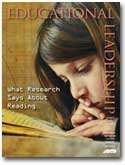The theme of the March 2004 issue of Educational Leadership is “What Research Says About Reading.” A review of the articles in this issue reveals that reading instruction remains a controversial topic—one that sparks passionate debate.
As Editor in Chief Marge Scherer writes in her “Perspectives” piece introducing this issue, several articles reflect the fact that the reading wars of the last few decades have now evolved into the Reading Research War. For a long time, education researchers and practitioners have debated what the research says about the best way to teach reading. These days, researchers have broadened the debate, disputing research methods, arguing about what kind of research studies are valid, and sometimes even questioning the motives of those who disagree with them.
Although the contentious debate about research methods and findings may seem to take place outside the real world of schools, its implications affect every school administrator, teacher, and student. Today, those who believe that “scientifically based research” is the only valid method to judge the effectiveness of instructional programs wield enormous influence over federal education policy and funding. All educators who select and implement reading programs need to understand the terms of this debate so that they can make informed decisions on the basis of what's right for their own students.
How Should Research Inform Curriculum Decisions?
- Results of experimental and quasi-experimental research on the approach published in peer-reviewed research journals.
- Observational studies describing the approach in action and discussing its strengths and weaknesses.
- First-hand opportunities to observe the approach at another school and to talk with educators who have used the approach.
- Your own experience teaching with this approach or a similar approach, including action research you conduct yourself to determine its effects on your own students.
- A combination of some or all of these.
Read David M. Liben and Meredith Liben's article (“Our Journey to Reading Success,” p. 58) for the story of how one school built its reading program on research, experience, and careful response to the needs of its own students. Discuss the strengths and weaknesses of this school's approach.
Can Research Ever Be Truly “Objective”?
Several articles in this issue cite the findings of the National Reading Panel in 2000, which concluded that reading programs are more effective if they emphasize phonemic awareness training and systematic phonics instruction. Articles by Sally E. Shaywtiz and Bennett A. Shaywitz (“Reading Disability and the Brain,” p. 6) and by G. Reid Lyon and Vinita Chhabra (“The Science of Reading Research,” p. 12) support the Panel's conclusions. But Stephen Krashen (“False Claims About Literacy Development,” p.18) and Gregory Camilli and Paula Wolfe (“Research on Reading: A Cautionary Tale,” p. 26) look at the same body of research and draw vastly different conclusions.
How much do you believe that the preconceived ideas of the National Reading Panelists—and those of the researchers who disagree with them—affect each group's interpretations of research findings? When you read this collection of articles, how much does your own personal philosophy of teaching and learning determine which authors you agree with? Discuss with your colleagues these questions: Is there any such thing as “objective” research? If so, how do you know it when you see it?
Effective Reading Instruction
Several articles in this issue provide practical, specific insights into the reading process to help teachers—working within the boundaries of the reading program chosen by their school or districts—give every student the support that he or she needs to learn to read. Here are a few discussion points.
Strategies Supporting Multiple Intelligences
Thomas Armstrong (“Making the Words Roar,” p. 78) views the reading process through the lens of Howard Gardner's theory of multiple intelligences. After reading about Armstrong's ideas for instructional strategies that emphasize readers' spatial, kinesthetic, logical, musical, intrapersonal, interpersonal, and naturalistic abilities, get together with a group of colleagues and brainstorm other strategies that you can use to support students' reading growth using their individual learning styles.
Vocabulary Knowledge
- Connie Juel and Rebecca Deffes (“Making Words Stick,” p. 30) discuss their study supporting the benefits of anchored word instruction—a method in which teachers lead students in analyzing the meaning, spelling, and sound of new words.
- Jane Katch (“The Most Important Words,” p. 62) describes how she uses a “word wall” to help her young students learn words that have special significance for them.
- Camille L. Z. Blachowicz and Peter Fisher (“Vocabulary Lessons,” p. 66) recommend four research-based practices for fostering vocabulary knowledge: developing love of words through word play; delivering explicit vocabulary instruction; building strategies for independent vocabulary growth; and engaging students with a wide range of books.

